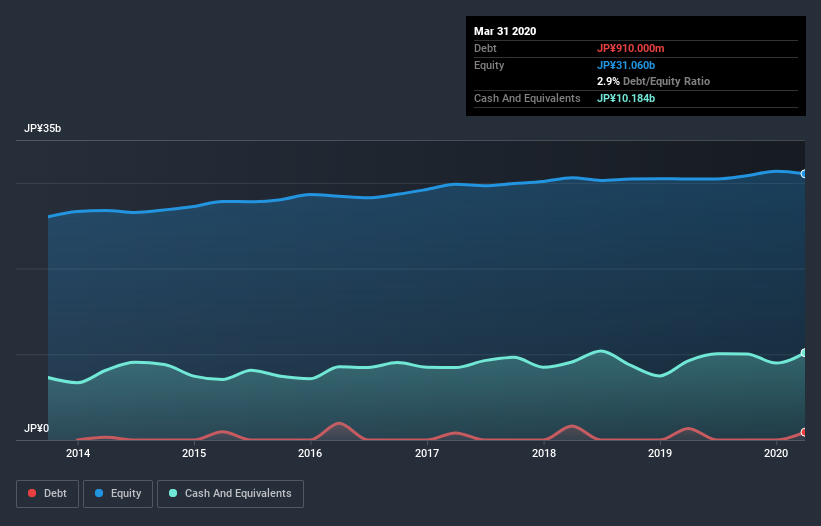
The external fund manager backed by Berkshire Hathaway's Charlie Munger, Li Lu, makes no bones about it when he says 'The biggest investment risk is not the volatility of prices, but whether you will suffer a permanent loss of capital. So it might be obvious that you need to consider debt, when you think about how risky any given stock is, because too much debt can sink a company. We can see that Hokkaido Chuo Bus Co., Ltd. (SPSE:9085) does use debt in its business. But the real question is whether this debt is making the company risky.
When Is Debt A Problem?
Debt is a tool to help businesses grow, but if a business is incapable of paying off its lenders, then it exists at their mercy. If things get really bad, the lenders can take control of the business. However, a more common (but still painful) scenario is that it has to raise new equity capital at a low price, thus permanently diluting shareholders. Of course, the upside of debt is that it often represents cheap capital, especially when it replaces dilution in a company with the ability to reinvest at high rates of return. The first thing to do when considering how much debt a business uses is to look at its cash and debt together.
See our latest analysis for Hokkaido Chuo Bus
What Is Hokkaido Chuo Bus's Debt?
The image below, which you can click on for greater detail, shows that Hokkaido Chuo Bus had debt of JP¥910.0m at the end of March 2020, a reduction from JP¥1.36b over a year. However, its balance sheet shows it holds JP¥10.2b in cash, so it actually has JP¥9.27b net cash.

A Look At Hokkaido Chuo Bus's Liabilities
We can see from the most recent balance sheet that Hokkaido Chuo Bus had liabilities of JP¥6.25b falling due within a year, and liabilities of JP¥4.06b due beyond that. Offsetting these obligations, it had cash of JP¥10.2b as well as receivables valued at JP¥3.74b due within 12 months. So it actually has JP¥3.62b more liquid assets than total liabilities.
This luscious liquidity implies that Hokkaido Chuo Bus's balance sheet is sturdy like a giant sequoia tree. On this view, lenders should feel as safe as the beloved of a black-belt karate master. Simply put, the fact that Hokkaido Chuo Bus has more cash than debt is arguably a good indication that it can manage its debt safely.
The good news is that Hokkaido Chuo Bus has increased its EBIT by 2.0% over twelve months, which should ease any concerns about debt repayment. There's no doubt that we learn most about debt from the balance sheet. But it is Hokkaido Chuo Bus's earnings that will influence how the balance sheet holds up in the future. So when considering debt, it's definitely worth looking at the earnings trend. Click here for an interactive snapshot.
Finally, a company can only pay off debt with cold hard cash, not accounting profits. While Hokkaido Chuo Bus has net cash on its balance sheet, it's still worth taking a look at its ability to convert earnings before interest and tax (EBIT) to free cash flow, to help us understand how quickly it is building (or eroding) that cash balance. Looking at the most recent three years, Hokkaido Chuo Bus recorded free cash flow of 41% of its EBIT, which is weaker than we'd expect. That's not great, when it comes to paying down debt.
Summing up
While we empathize with investors who find debt concerning, you should keep in mind that Hokkaido Chuo Bus has net cash of JP¥9.27b, as well as more liquid assets than liabilities. On top of that, it increased its EBIT by 2.0% in the last twelve months. So we don't think Hokkaido Chuo Bus's use of debt is risky. When analysing debt levels, the balance sheet is the obvious place to start. However, not all investment risk resides within the balance sheet - far from it. For example, we've discovered 3 warning signs for Hokkaido Chuo Bus (1 can't be ignored!) that you should be aware of before investing here.
If, after all that, you're more interested in a fast growing company with a rock-solid balance sheet, then check out our list of net cash growth stocks without delay.
If you’re looking to trade Hokkaido Chuo Bus, open an account with the lowest-cost* platform trusted by professionals, Interactive Brokers. Their clients from over 200 countries and territories trade stocks, options, futures, forex, bonds and funds worldwide from a single integrated account. Promoted
Valuation is complex, but we're here to simplify it.
Discover if Hokkaido Chuo Bus might be undervalued or overvalued with our detailed analysis, featuring fair value estimates, potential risks, dividends, insider trades, and its financial condition.
Access Free AnalysisThis article by Simply Wall St is general in nature. It does not constitute a recommendation to buy or sell any stock, and does not take account of your objectives, or your financial situation. We aim to bring you long-term focused analysis driven by fundamental data. Note that our analysis may not factor in the latest price-sensitive company announcements or qualitative material. Simply Wall St has no position in any stocks mentioned.
*Interactive Brokers Rated Lowest Cost Broker by StockBrokers.com Annual Online Review 2020
Have feedback on this article? Concerned about the content? Get in touch with us directly. Alternatively, email editorial-team@simplywallst.com.
About SPSE:9085
Hokkaido Chuo Bus
Engages in the passenger car transportation business in Japan.
Flawless balance sheet with solid track record.
Market Insights
Community Narratives



